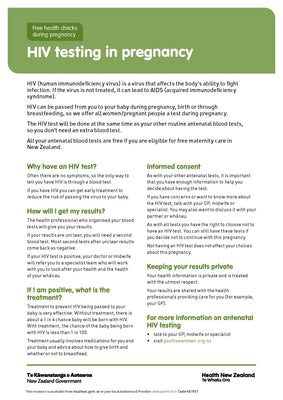HIV testing in pregnancy - HE1901

People are offered an antenatal screening test for HIV/AIDS as part of their routine antenatal care. This pamphlet explains the test.
See also similar resource with photographs HIV Testing in Pregnancy: Part of Antenatal Blood Tests HE1832
The full resource:
Free health checks during pregnancy
HIV (human immunodeficiency virus) is a virus that affects the body’s ability to fight infection. If the virus is not treated, it can lead to AIDS (acquired immunodeficiency syndrome).
HIV can be passed from you to your baby during pregnancy, birth or through breastfeeding, so we offer all women/pregnant people a test during pregnancy.
The HIV test will be done at the same time as your other routine antenatal blood tests, so you don’t need an extra blood test.
All your antenatal blood tests are free if you are eligible for free maternity care in New Zealand.
Why have an HIV test?
Often there are no symptoms, so the only way to tell you have HIV is through a blood test. If you have HIV you can get early treatment to reduce the risk of passing the virus to your baby.
How will I get my results?
The health professional who organised your blood tests will give you your results. If your results are unclear, you will need a second blood test.
Most second tests after unclear results come back as negative.
If your HIV test is positive, your doctor or midwife will refer you to a specialist team who will work with you to look after your health and the health of your whānau.
If I am positive, what is the treatment?
Treatment to prevent HIV being passed to your baby is very effective. Without treatment, there is about a 1 in 4 chance baby will be born with HIV. With treatment, the chance of the baby being born with HIV is less than 1 in 100.
Treatment usually involves medications for you and your baby and advice about how to give birth and whether or not to breastfeed.
Informed consent
As with your other antenatal tests, it is important that you have enough information to help you decide about having the test.
If you have concerns or want to know more about the HIV test, talk with your GP, midwife or specialist. You may also want to discuss it with your partner or whānau.
As with all tests you have the right to choose not to have an HIV test. You can still have these tests if you decide not to continue with this pregnancy.
Not having an HIV test does not affect your choices about this pregnancy.
Keeping your results private
Your health information is private and is treated with the utmost respect.
Your results are shared with the health professionals providing care for you (for example, your GP).
For more information on antenatal HIV testing
- talk to your GP, midwife or specialist
- visit Positive Women